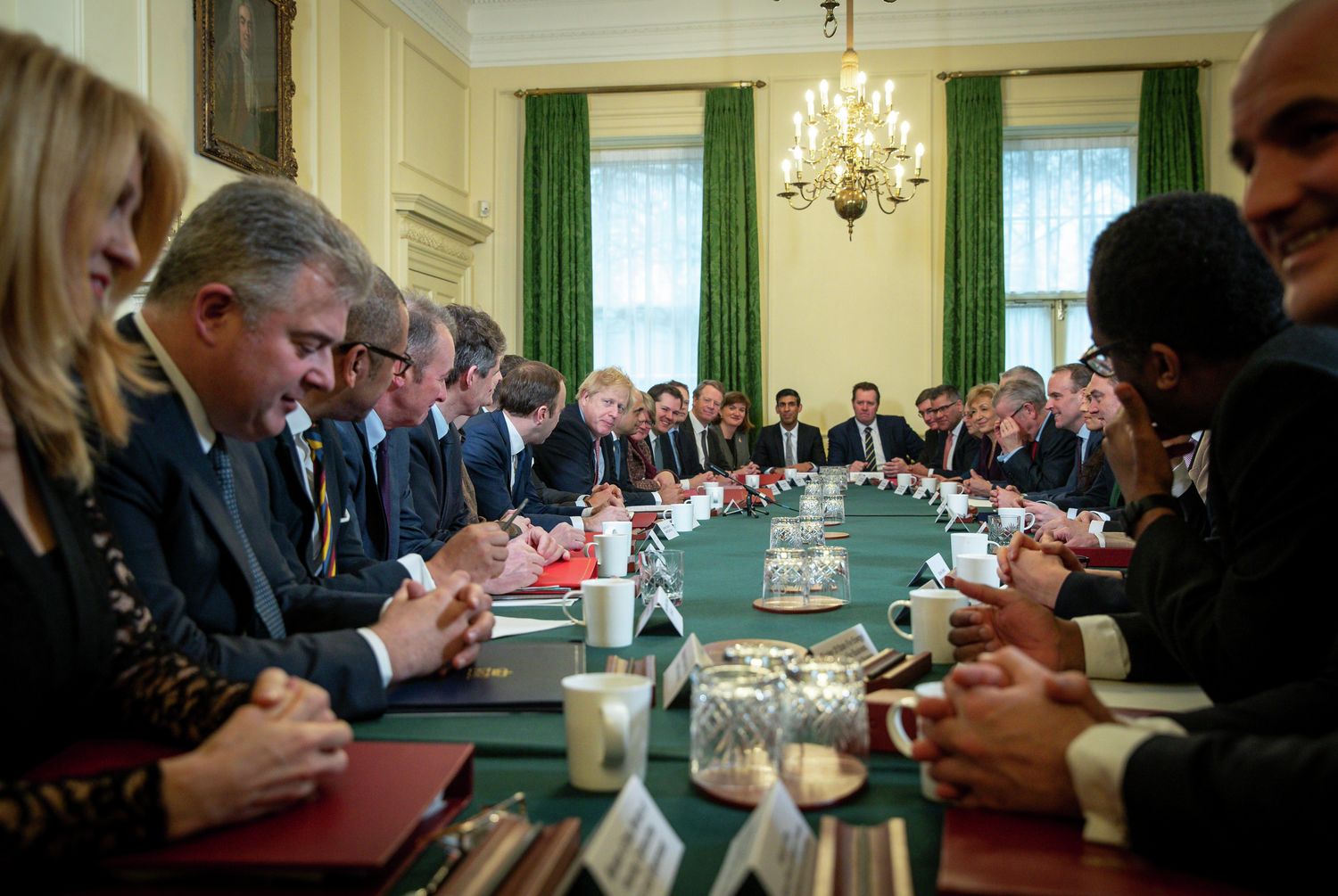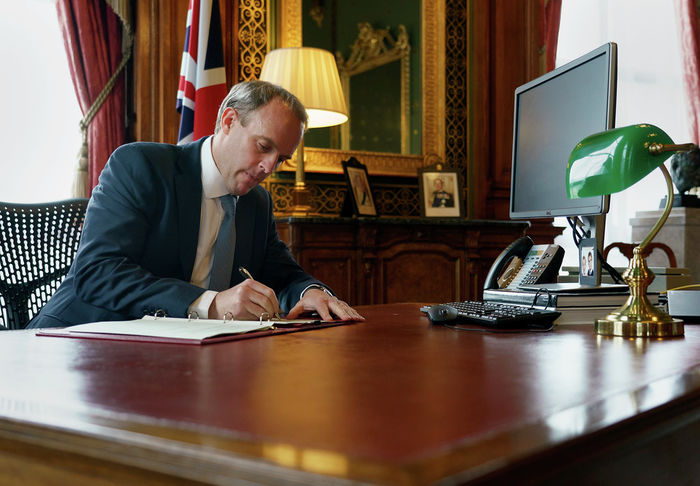I was on holiday with friends when the news broke – Boris Johnson’s cabinet reshuffle was imminent. And from that moment on, my eyes were glued to the news feed, throwing out predictions – who was in, who was out, the only certainties being that Gavin Williamson was out, and Sunak was in. My friend and I, both nerdily obsessed with such things, sat in the middle of a bowling alley, juicing every Twitter lead, garnering every rumour and detail and assessing the feasibility of each. Patel out? Maybe. Gove for Housing Minister? As if. Evidentially, we weren’t necessarily 100% correct, and some changes were so surprising even those involved looked weirdly confused as they entered No. 10, about to receive an unexpected promotion.
However, more often than not, we were not spot on, and that’s what’s so striking about this latest reshuffle. Not only was it by quite some length the most dramatic since Johnson took charge, but it was also bewilderingly (and as a devoted left-winger I can’t believe I’m typing this) acceptable.
The first major shock was not, as the papers seemed to want to suggest, the removal of Williamson, whose spectacular incompetence is nearly on par with the likes of Grayling and Hancock. That man was directly responsible for me not meeting my Cambridge offer, leaving me in limbo for eight days until a catastrophic U-turn – my sympathies for him are non-existent. He had to go.
Nor was the loss of Robert Buckland particularly shocking, despite him being widely thought of as a “respected figure in the legal profession.” For me, at least, the only shock regarding Buckland was that he apparently was a) respected, and b) thought of at all. No, the first shock for me was Robert Jenrick’s removal as Housing Minister. Jenrick was a devoted Johnsonite, having supported him from early on in his leadership bid. Furthermore, even though he famously unlawfully accepted planning proposals for a closely linked Conservative Party donor, this scandal had largely washed over him as a result of his general forgettableness. Indeed, I’d forgive people for having only just remembered he exists at all.
"It is the first time Johnson has not met loyalty with reward, but rather met incompetence with retribution"
This removal came as a shock, exacerbated further by his departure from the Cabinet entirely, because Johnson could have allowed him to stay on or demoted him, and it wouldn’t have made a jot of difference in terms of public opinion. Rather, Johnson sacked him either because of the scandals associated with him, or because he had a certain someone in mind to fill the role (*cough* Gove *cough*). Whatever the reason, it comes as a surprise because it is the first time Johnson has not met loyalty with reward, but rather met incompetence with retribution.
Jenrick’s role went to Michael Gove. This was bizarre since, superficially, it was a demotion. As Chancellor to the Duchy of Lancaster, Gove hardly had a specific role, and had the freedom to take on anything he deemed himself suitable for. Now, however, he is stuck in a permanent, full time, and relatively monodirectional role, his main task: reform housing policy.
"Gove, whether you love him or hate him, does stuff"
However, the more Twitter declared its thoughts on the move, the more it made sense to me. The Chesham and Amersham by-election proved just how important housing policy is in the Tory heartlands of the commuter belt, and that’s a lot for Jenrick to live up to. Gove, whether you love him or hate him, does stuff. Whether he does it well or not depends on who you ask; as someone who sat his new-style GCSEs, I’d be much inclined towards the latter. Bringing him to the brief of Housing Minister means that there will actually be housing policy, and Johnson is simply making the gamble that it will be one that wins over voters. Of course, he has been in trouble for his acceptance of a £100,000 donation from a property developer, but unlike Jenrick’s scandal, this hasn’t really made enough headlines to cause Johnson any concern.
The second big event of the day was the shunting of Raab. It was a bizarre affair, and the discussions in No. 10 took far too long for the demotion to have been plain sailing. The move, of course, comes as no surprise given Raab’s recent history (which I discuss here). Now, after what appears to have been fierce negotiation, Raab emerges as Justice Secretary and Lord Chancellor (the roles Johnson clearly wanted for him, given the earlier departure of grey-man Buckland), and Deputy Prime Minister, a cursed chalice only officially held by Nick Clegg, John Prescott, and Michael Heseltine, for each of whom the role signalled the end of their careers. Quite why Raab was content to settle for this is unclear: after all, the role puts him in the firing line for any criticism of Johnson’s government, without actually giving him much power he didn’t already hold as First Secretary of State. It seems to have been a bit like throwing the dog a bone, but instead of a bone it’s a vacuously ceremonial title the dog can hold while sitting in his new, smaller kennel, fantasising about his next Mediterranean getaway.
Raab’s replacement is Liz Truss, the bizarre favourite of the Party’s membership. In fairness, there are few better positioned in the parliamentary party – Truss has, of course, been the International Trade Secretary under Johnson, and, ignoring her strange on-off relationship with international cheese markets (see this and this), she’s made the best of a bad situation. As Trade Sec, she has secured trade deals that mean in a few small places like Norway, Iceland, and Liechtenstein, the UK is basically on the same footing as it was pre-Brexit; in Australia and Japan, we have better trade deals than ever. Admittedly, Britain’s international trade as a whole has massively struggled, to put it mildly, during her time, with more than a few hiccoughs regarding both Brexit and the ongoing pandemic; but one struggles to blame Truss for this, since she was originally an ardent Remainer, and it was Johnson and Lord Frost who led the Brexit negotiations.
"Truss is...a considerable threat to Johnson from within the party"
Truss is a bold choice from Johnson. On the one hand, the fact that she’s been kept largely out of public view, despite having been in the cabinet since 2014, means that she’s relatively untested in terms of public, and hence international, opinion. But on the other, she’s a considerable threat to Johnson from within the party – an oft-cited ConservativeHome poll from last December puts her at a +75.4 net satisfaction rate, with Johnson at +2.9, making her the most popular cabinet minister at the time, and she was labelled “brand Rishi before brand Rishi was a thing” by a Tory insider.
The recurring theme, then, appears to be competence over loyalty – unchartered territory for Johnson. Gove, Truss, and especially Williamson’s successor Nadhim Zahawi, are all somewhat separate from the Johnsonian clique that Jenrick, Raab and Williamson belong to, and measurably more competent (here a relative term, since the idea of calling Gove competent sends a shiver down my spine). In all honesty, not having an Education Secretary at all would have been an improvement on Williamson, but Zahawi, who gained notoriety this past year as the Vaccines Minister (the thing, not the band) seems a fairly sensible choice. Of course, Zahawi is far from a desirable EdSec, having been privately educated, and made his name as CEO of YouGov rather than anything education-related, but of those available, it could be a lot worse.
"This might be best understood as his shift from a “wartime government” responsible for dealing with Brexit and the pandemic, to a “peacetime government” that genuinely will improve the state of the country"
While there are choices to cause alarm even by Johnsonian standards – namely the promotions of Dorries, Barclay and Clarke, and the outright weird decision to make Dowden the Chair of the Party – the most senior roles up for grabs in the reshuffle signal a shift in Johnson’s ministry. This might be best understood as his shift from a “wartime government” responsible for dealing with Brexit and the pandemic, to a “peacetime government” that genuinely will improve the state of the country: more Attlee, less Churchill. Of course, he won’t be successful in this. This is still a Conservative government, locked in a generational war and built on a populist brand without an ideology, championed by a serially hopeless Prime Minister. But perhaps – and it’s a very, very slim hope – this might be the beginning of a government that actually wants to govern.


